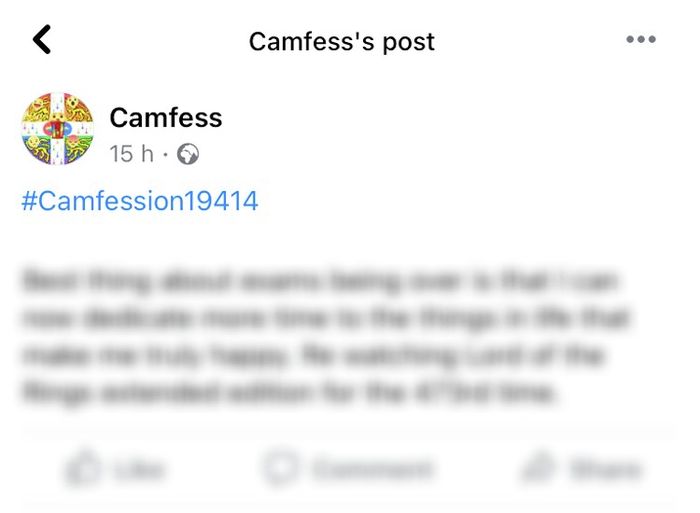Inside Camfess: Admins reveal all
Varsity speaks to the students behind the screen

With over 7,000 likes on Facebook, Camfess is a staple of Cambridge life. It’s where people go to vent about their workload, vocalise dissent towards the runnings of the university, or gossip about the latest acts of sexual deviance at their college. In short, it is a medium for catharsis, and a place where the student body can anonymously share nuggets of their lives.
But what about the students behind the account? Varsity spoke to the admins who keep Camfess alive, in an attempt to inject some humanity into the faceless and nameless.
Of the recruitment process, Camfess said, “Being an admin is an anonymous endeavour, and a commitment for the rest of your time at Cambridge! We have a Google Form which is always open.”
“We go for pints sometimes - the last one ended up getting slightly debauched”
While roles aren’t formally advertised, admins will consider new people when their numbers are running low, but generally the group is of “a decent size.” When searching for new admins, they look for people from a wide range of “colleges, subjects, year groups, identities and social bubbles,” but above all, people who are “kind”. If the admins are keen on welcoming you to the team, the final stage of the process is a coffee-shop interview.
When a new admin is brought in, they are introduced to the others in person. “We go for pints sometimes - the last one ended up getting slightly debauched by the end. Some of us are friends anyway, which is how they got dragged into Camfess, and others have become friends through Camfess.”
Being a social staple in the Camfess team is a tradition that continues long after their time at Cambridge is over. Current admins have a shared Discord server, on which alumni dating back as far as 2018 still “linger around”.
The Camfess of today hasn’t always been around, however, and its Facebook name, ‘2 Cam 2 Fess’ is a nod to its predecessor (Camfess I), which was shut down last June due to a slew of guideline violation strikes. One instance included a student joking ‘If another pedestrian steps into the road without looking, I’m going to drop kick them into the sun,’ which was removed for ‘inciting violence.’
“It got to the point that we were so paranoid about posting jokes which could be misconstrued by the algorithm that we felt like we couldn’t let through anything vaguely tongue-in-cheek or edgy. It just wasn’t very fun.”
“There’s no way of tracing a post back to an individual or even an IP address”
The admins are highly conscious of the influence they have, and do not take this lightly. “People are candid because they feel they can be, and this is the main reason we take our anonymity seriously (…) there’s no way of tracing a post back to an individual or even an IP address.”
Navigating this is difficult for the admins. On the one hand, they want to “create an environment where people feel safe to share their inner thoughts without fear of stigma or personal repercussions,” and often commenters offer advice, and words of kindness. On the other hand, Camfess has a duty to maintain the mostly lighthearted tone of the page, while also being careful not to post anything that might trigger readers.
Because of this, there are steps taken when a student expresses that they are struggling, such as directing them to a Linktree with mental health resources (hotline numbers, counselling services, sexual assault and harassment advice). But if people are turning to Camfess for an emotional release, it begs the question: why isn’t the university doing more to provide safe spaces that students can turn to for more tangible help?
How do the admins decide which posts are unsuitable for sharing? They have a strict set of internal guidelines: “It’s mostly common sense - any which target specific people who aren’t public figures, or holders of elected public roles, any in which the person reveals their identity, anything bigoted, and anything that we know will get us banned.”
The protocol when asked to take a post down is simple: they do, especially if the alternative threatens to make them enemies in high places. “Sometimes representatives from elected bodies convey their strong feelings through flowery language with a healthy dose of thinly veiled legal threats.”
Whether you’re a silent consumer or an active submitter of Camfesses, its cultural impact on the university is undeniable. Should there be more in place to ensure that students who post worrying confessions are able to be helped, or would this destroy the integrity of Camfess and lead to more young people bottling up their emotions? Like the admins said, it is something of a double-edged sword.
Keep an eye out at Spoons for any Camfess debauchery in future - who knows, maybe you will be Camfess’ next admin and then you can decide for yourself.
 Comment / Cambridge’s tourism risks commodifying students18 April 2025
Comment / Cambridge’s tourism risks commodifying students18 April 2025 News / Cambridge student numbers fall amid nationwide decline14 April 2025
News / Cambridge student numbers fall amid nationwide decline14 April 2025 News / Greenwich House occupiers miss deadline to respond to University legal action15 April 2025
News / Greenwich House occupiers miss deadline to respond to University legal action15 April 2025 Comment / The Cambridge workload prioritises quantity over quality 16 April 2025
Comment / The Cambridge workload prioritises quantity over quality 16 April 2025 News / Varsity ChatGPT survey17 April 2025
News / Varsity ChatGPT survey17 April 2025





